|
|
|
Sort Order |
|
|
|
Items / Page
|
|
|
|
|
|
|
| Srl | Item |
| 1 |
ID:
154052
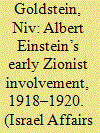

|
|
|
|
|
| Summary/Abstract |
This article presents the very beginning of Albert Einstein’s involvement on behalf of the Zionist movement. Although he was familiar with Zionist activists, it was only World War I and the rabid anti-Semitism attending it that led him to rediscover his affiliation with the Jewish people and to subscribe to the Zionist solution to their misery. Einstein tried to combine his support for the national Zionist ideals with the universal worldview to which he adhered from time immemorial, gradually coming to support establishment of the national home in Palestine as a solution for ‘The Jewish Problem’.
|
|
|
|
|
|
|
|
|
|
|
|
|
|
|
|
| 2 |
ID:
112534
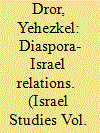

|
|
|
| 3 |
ID:
112536


|
|
|
|
|
| Publication |
2012.
|
| Summary/Abstract |
Professor Gabriel Sheffer is correct in asserting that relations between Israel and Diaspora Jews are more fraught than they have been in a long time, and that according to some measures, American Jewish support for Israel may be on the decline. Such support, of course, is difficult to measure, and in many respects, American Jewish support for Israel remains strong. We are, without a doubt, living in a period of significantly shifting sands, and we are in Sheffer's debt for not only pointing to it, but for suggesting some of its causes.
|
|
|
|
|
|
|
|
|
|
|
|
|
|
|
|
| 4 |
ID:
127936
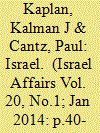

|
|
|
|
|
| Publication |
2014.
|
| Summary/Abstract |
Political attitudes towards the modern state of Israel are substantially influenced by underlying theological issues in Pauline Christianity regarding ethnic versus spiritual Israel. The very charge of Israel as occupier can be seen as an inverted perception or even a psychological projection emerging from the supersessionist view that the Pauline Church is the New Israel, displacing the Jewish people as God's elect. Hard and soft political charges of Israel as 'occupier' are discussed as are hard and soft claims of theological supersessionism. Dual covenant Christians tend not to espouse the view of Israel as occupier. Finally, these political and theological realms of thinking are linked in an attempt to bring psychological clarity to the peculiar nature of political projection towards the modern state of Israel, among Christians and even post-Christians in the West.
|
|
|
|
|
|
|
|
|
|
|
|
|
|
|
|
| 5 |
ID:
112540


|
|
|
|
|
| Publication |
2012.
|
| Summary/Abstract |
Israel's "New History" has itself become history. What in the late 1980s and 1990s appeared to be shocking revelations about Israeli policy in 1948 have become anodyne. In Israeli academia, many of the New Historians' arguments have become mainstream, as they have been debated, examined, and found to be by and large accurate. What is more, the New Historians' findings now spur little controversy in Israeli society as a whole. Some Israelis outside of academia have developed a more critical approach to their country's past, but many more have responded to the nearly constant Israeli-Arab strife of the past decade by forming a jaundiced view of the country's historical record and justifying Israeli aggression and brutality as unfortunate but necessary measures in an endless war against an unappeasable foe. Thus recent revisionist accounts of the 1967 war have received far less press and been far less controversial than their predecessors on 1948 and 1956. So what, Israelis may ask, if, as Tom Segev's massive tome on 1967 argues, Israel hankered for war in order to pull the country out of the funk induced by the 1966 recession?1
|
|
|
|
|
|
|
|
|
|
|
|
|
|
|
|
| 6 |
ID:
138487
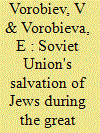

|
|
|
|
|
| Summary/Abstract |
This year will see the 70th anniversary of the Great Victory, one more illustrious jubilee date commemorating the end of the Great Patriotic War. But this year, along with voices from progressive forces that make objective assessments of events and results of the Second World War, stressing their significance and prominence, in some countries obnoxious (there is no other word) officials are coming forward and so-called historians are waking up who are painting upside-down pictures of all that has to do with that global tragedy.
|
|
|
|
|
|
|
|
|
|
|
|
|
|
|
|
| 7 |
ID:
126899
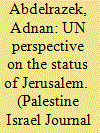

|
|
|
|
|
| Publication |
2011.
|
| Summary/Abstract |
Palestine was a province of the Ottoman Empire for 400 years. With the empire's collapse as a result of World War I, the League of Nations placed Palestine under a mandate which it assigned to the United Kingdom. The British Mandate of Palestine, which was confirmed in 1922, put into effect the Balfour Declaration of 1917 whose principal objective was "the establishment in Palestine of a national home for the Jewish people." The terms of the mandate, which favored an increase in Jewish immigration to Palestine, were opposed by the Arabs, as it aroused growing fears of a Jewish takeover in Jerusalem and elsewhere in the country. This produced great tension between Arabs and Jews, particularly in Jerusalem and specifically around al-Aqsa Mosque and al-Buraq (the Western Wall).
|
|
|
|
|
|
|
|
|
|
|
|
|
|
|
|
|
|
|
|
|